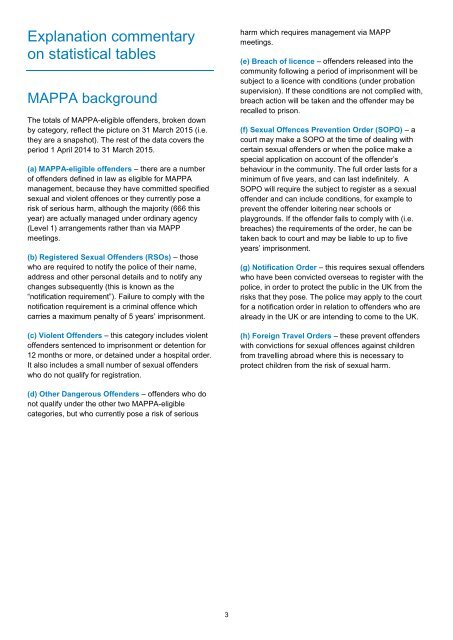You also want an ePaper? Increase the reach of your titles
YUMPU automatically turns print PDFs into web optimized ePapers that Google loves.
Explanation commentary<br />
on statistical tables<br />
MAPPA background<br />
The totals of MAPPA-eligible offenders, broken down<br />
by category, reflect the picture on 31 March 2015 (i.e.<br />
they are a snapshot). The rest of the data covers the<br />
period 1 April 2014 to 31 March 2015.<br />
(a) MAPPA-eligible offenders – there are a number<br />
of offenders defined in law as eligible for MAPPA<br />
management, because they have committed specified<br />
sexual and violent offences or they currently pose a<br />
risk of serious harm, although the majority (666 this<br />
year) are actually managed under ordinary agency<br />
(Level 1) arrangements rather than via MAPP<br />
meetings.<br />
(b) Registered Sexual Offenders (RSOs) – those<br />
who are required to notify the police of their name,<br />
address and other personal details and to notify any<br />
changes subsequently (this is known as the<br />
“notification requirement”). Failure to comply with the<br />
notification requirement is a criminal offence which<br />
carries a maximum penalty of 5 years’ imprisonment.<br />
(c) Violent Offenders – this category includes violent<br />
offenders sentenced to imprisonment or detention for<br />
12 months or more, or detained under a hospital order.<br />
It also includes a small number of sexual offenders<br />
who do not qualify for registration.<br />
harm which requires management via MAPP<br />
meetings.<br />
(e) Breach of licence – offenders released into the<br />
community following a period of imprisonment will be<br />
subject to a licence with conditions (under probation<br />
supervision). If these conditions are not complied with,<br />
breach action will be taken and the offender may be<br />
recalled to prison.<br />
(f) Sexual Offences Prevention Order (SOPO) – a<br />
court may make a SOPO at the time of dealing with<br />
certain sexual offenders or when the police make a<br />
special application on account of the offender’s<br />
behaviour in the community. The full order lasts for a<br />
minimum of five years, and can last indefinitely. A<br />
SOPO will require the subject to register as a sexual<br />
offender and can include conditions, for example to<br />
prevent the offender loitering near schools or<br />
playgrounds. If the offender fails to comply with (i.e.<br />
breaches) the requirements of the order, he can be<br />
taken back to court and may be liable to up to five<br />
years’ imprisonment.<br />
(g) Notification Order – this requires sexual offenders<br />
who have been convicted overseas to register with the<br />
police, in order to protect the public in the UK from the<br />
risks that they pose. The police may apply to the court<br />
for a notification order in relation to offenders who are<br />
already in the UK or are intending to come to the UK.<br />
(h) Foreign Travel Orders – these prevent offenders<br />
with convictions for sexual offences against children<br />
from travelling abroad where this is necessary to<br />
protect children from the risk of sexual harm.<br />
(d) Other Dangerous Offenders – offenders who do<br />
not qualify under the other two MAPPA-eligible<br />
categories, but who currently pose a risk of serious<br />
3



